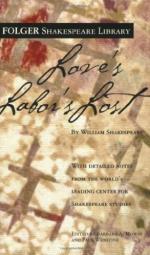|
This section contains 6,400 words (approx. 22 pages at 300 words per page) |

|
SOURCE: "Love's Labour's Lost: A Wantoning with Words," in Studies in English Literature 1500-1900, Vol. V, No. 2, Spring, 1965, pp. 317-32.
In the following excerpt, Calderwood asserts that in Love's Labour's Lost Shakespeare begins by focusing on language as an art form rather than as a source of meaning, but ends by preparing the way for his more accomplished and meaningful later comedies.
When Bacon diagnosed the "study [of] words and not matter" as symptomatic of the "first distemper of learning," he might have been thinking, not only of the word-entranced scholars in Love's Labour's Lost, but of Love's Labour's Lost itself. For surely nowhere else in Shakespeare do we find words so ascendant over matter, and language so insistently the mother, and not the mistress, of meaning. In perhaps no other play does language so nearly become an autonomous symbolic system whose value, somewhat like that of pure...
|
This section contains 6,400 words (approx. 22 pages at 300 words per page) |

|


